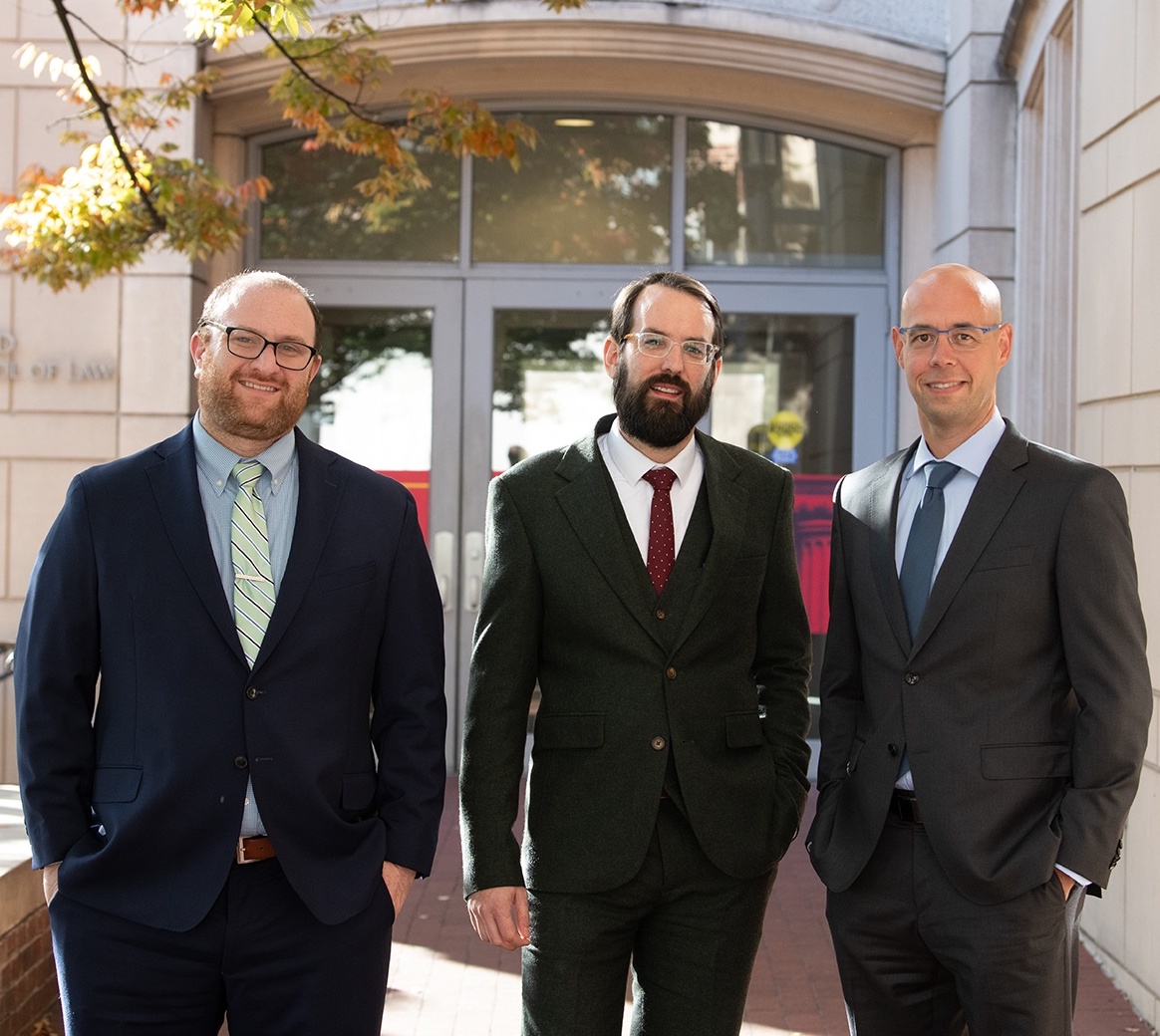Maryland Carey Law’s Center for Health and Homeland Security Helps Shape State’s AI Response
January 22, 2025 Laura Lee
Read how academic expertise and real-world consulting allow the center to bridge the gap between legal theory and practical implementation of emerging technologies in the latest issue of “CATALYST.”
Photo: The University of Maryland Center for Health and Homeland Security’s (from left) Ben Yelin, Chris Webster, and Markus Rauschecker. Photo by Matthew D’Agostino
When Maryland legislators needed to craft policies for artificial intelligence (AI) this year, they faced the daunting task of regulating a technology that evolves faster than laws can be written.
“Everyone recognizes the immense potential that AI can have on innovation, on improving efficiency, on just problem solving across industries,” said Markus Rauschecker, JD, cybersecurity program director at the University of Maryland Center for Health and Homeland Security (CHHS). “But we also recognize there are risks with this new technology, and we have to be mindful of those risks and how we can best address them.”
That’s where CHHS stepped in, providing crucial research and guidance that helped shape the state’s landmark Artificial Intelligence Governance Act that was signed into law by Gov. Wes Moore in spring 2024.
Throughout 2023, CHHS research assistants studied AI governance regulations across multiple states, presenting their findings to the Joint Committee on Cybersecurity, Information Technology and Biotechnology in the interim session.
In March 2024, the center’s research team, led by public policy and external affairs program director Ben Yelin, JD, and CHHS extern Quinn Laking, submitted a comprehensive report to the General Assembly detailing what other states are doing to regulate AI.
“Based on this research, we were able to identify best practices of other states that are wrestling with the task of balancing the potential benefits of AI while also establishing guardrails against its most deleterious effects,” Yelin said during testimony before the General Assembly last spring.
The resulting law requires state agencies to inventory their AI systems, mandates transparency in how AI is deployed, and prohibits agencies from using AI systems in “high-risk” scenarios that could violate constitutional rights.
The role in shaping AI policy is a natural extension of CHHS’ mission. Founded in 2002 by Michael Greenberger, JD, at the University of Maryland Francis King Carey School of Law, CHHS has evolved from a small policy center into a comprehensive consulting organization serving more than 80 clients worldwide. The center’s work spans emergency management, cybersecurity, public health, and homeland security. CHHS professionals develop plans for disaster response, create training programs for first responders, and help agencies navigate complex technology decisions.
The center maintains deep ties to Maryland Carey Law, where staff teach courses in cybersecurity and crisis management law while providing hands-on experience to law students through externships and research opportunities. The combination of academic expertise and real-world consulting allows CHHS to bridge the gap between legal theory and practical implementation of emerging technologies such as AI.
Read more about the center here.
You can read the Fall 2024 issue of CATALYST magazine, which highlights the School of Dentistry's efforts to provide dentures to seniors through a grant program; School of Pharmacy recent graduate Alena Abraham's podcast dedicated to supporting the blind and visually impaired community; Mary Maldarelli, a fellow in Pulmonary and Critical Care Medicine and 2019 School of Medicine graduate using her musical talents to create a therapeutic healing environment; Taofeek K. Owonikoko, MD, PhD, the new executive director of the University of Maryland Marlene and Stewart Greenebaum Comprehensive Cancer Center; and much, much more!